Welcome to Baylor Scott & White Medical Center–Frisco—Frisco, Texas

by Heidi Fuller
Ms. Fuller is the Director of Marketing and Public Relations at Baylor Scott & White Medical Center–Frisco in Frisco, Texas.
Funding: No funding was provided.
Disclosures: The author reports no conflicts of interest relevant to the content of this article.
Bariatric Times. 2023;20(5–6):24–26.
Experiencing an over 300-percent increase in bariatric surgical volume over a period of four years, Baylor Scott & White Medical Center–Frisco performed 1,023 bariatric surgeries in 2022 alone. Our facility is a Metabolic and Bariatric Surgery Accreditation and Quality Improvement Program (MBSAQIP)-certified Comprehensive Center for metabolic and bariatric surgery and is a Blue Distinction Center Plus for Bariatric Surgery (BDC+). Our 68-bed surgical facility has a hotel-like atmosphere, dedication to innovation, and outstanding patient care. The bariatric program at Baylor Frisco offers a comprehensive, multidisciplinary, patient-centered approach, using the latest minimally invasive techniques, and heavily focuses on robotic surgery.
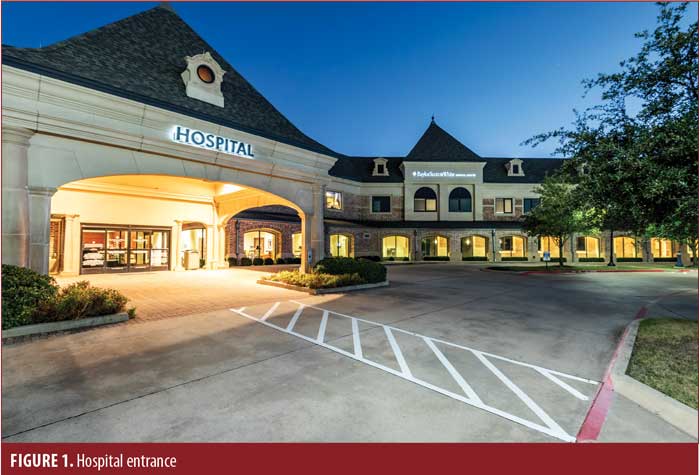
Talented and Dedicated Staff
Our bariatric surgery program, led by Director Dr. Sheetal Patel, includes 12 board-certified, MBSAQIP-verified bariatric surgeons, two licensed dietitians, a bariatric coordinator, and two full-time and one part-time metabolic and bariatric surgery clinical reviewers (MBSCRs).
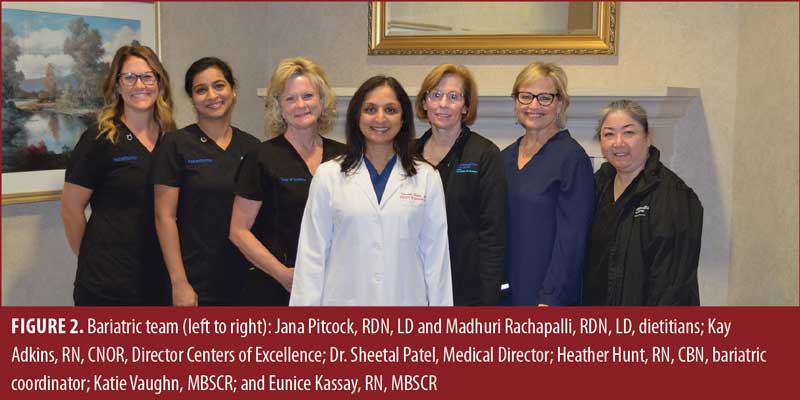
Our bariatric coordinator oversees and helps organize the clinical activities of our bariatric surgery program. She is responsible for maintaining accreditation standards, submitting data to regulatory bodies, and collecting program outcome data to help implement quality improvement initiatives. She provides pre- and postoperative education to our patients and organizes monthly bariatric support groups. Our monthly support groups provide ongoing encouragement to our patients and their families as they journey to better health. Our coordinator also educates nurses and staff and coordinates with physicians to help patients with individualized treatment plans.
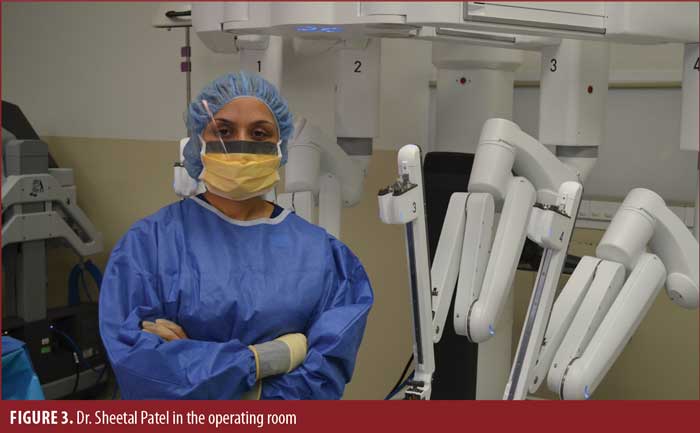
Our licensed dietitians educate our patients regarding the importance of taking in enough fluids and protein after bariatric surgery. Patients are informed about their surgeon’s specific dietary requirements. During their education, fluid and protein goals are set and tracking techniques are introduced to ensure success after surgery.
Bariatric Technology
Our hospital is dedicated to adopting the newest and most advanced techniques and equipment. Some examples are:
- QueaseEASE essential oils (Soothing Scents; Newton, Alabama): These are foil-covered pods containing lavender, peppermint, spearmint, and ginger essential oils. The foil is peeled back, and the patient sniffs the oils, which helps reduce nausea.
- Da Vinci Xi robots (Intuitive Surgical, Inc.; Sunnyvale, California): There are four da Vinci Xi robots in our operating room (OR) that our bariatric surgeons use to perform robotic bariatric surgery.
- Intuitive Universal Seal (Intuitive Surgical, Inc.; Sunnyvale, California): These are trocar caps used during surgery with the da Vinci Xi robot. Benefits include:
- Standardizing the da Vinci X and Xi procedure setup; one seal for all X/Xi cases
- Minimizing gas leakage when a 5mm lap instrument is used through a 12mm port (pneumoperitoneum is maintained with Universal Seal)
- Simplifying purchasing and inventory management
- Reducing the occurrence of opening incorrect seals
- Utilizing a low-friction seal, which enhances instrument/endoscope interaction (compared to X/Xi seals).
- ViSiGi 3D Bariatric Sizing and Calibration System (Boehringer Laboratories, LLC; Phoenixville, Pennsylvania): The benefits of ViSiGi 3D include:
- Delineateing and indicating proper staple line placement
- Significantly decreasing the time needed to complete each step of sleeve gastrectomy, reducing operating time
- Using suction to maintain equalized tension on both sides of the stomach, thereby reducing corkscrewing
- Using fewer tube insertions, which can reduce esophageal damage and accidental tube stapling.
Our hospital has the appropriate equipment and furniture to safely care for our bariatric patients. We have a no manual lifting policy. Instead, we have Hovermatts (HoverTech International; Allentown, Pennsylvania) and slide boards to move patients. We also have a bariatric transfer board for transferring a bariatric patient from a wheelchair to a chair and a battery-powered Hoyer Lift that accommodates up to 700lbs.
Bariatric Patient Care and Staff Training
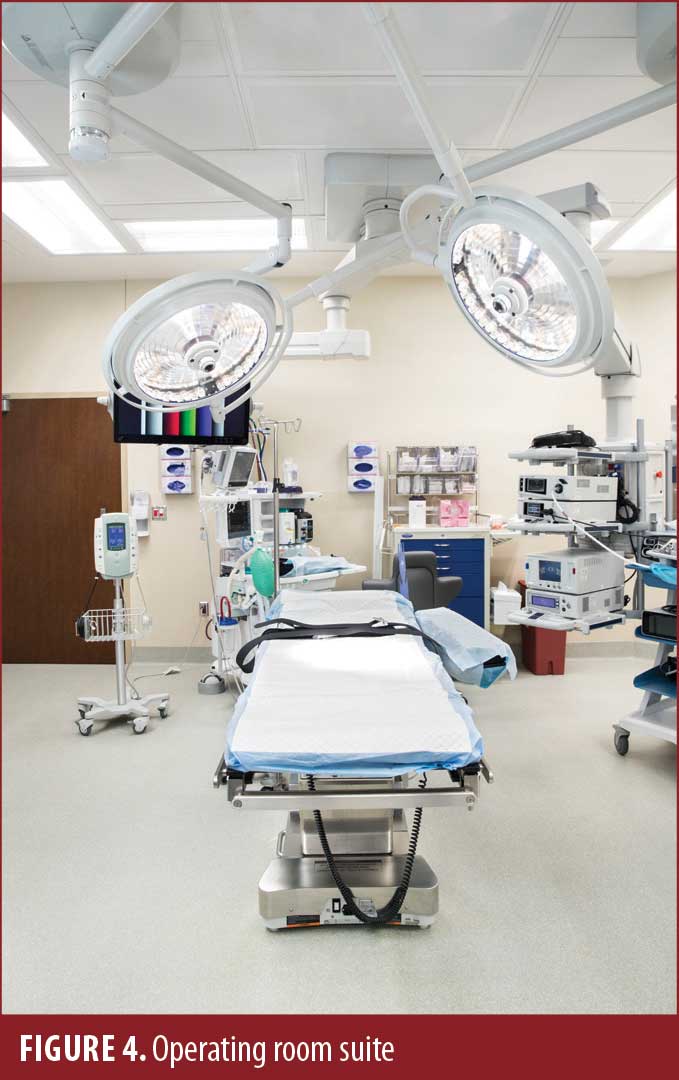
Every patient who walks through our doors becomes a member of the Baylor Frisco family. Our bariatric patients are treated respectfully, with obesity sensitivity in mind from the time they arrive to their discharge. Before surgery, our bariatric coordinator and a dietitian visit patients and provide postoperative discharge instructions and dietary education. Patients are also given information about the program’s support group meetings. All education is completed in a Health Insurance Portability and Accountability Act of 1996 (HIPPA)-compliant manner. The patient’s case is only discussed directly with the surgeon, patient, and staff caring for the patient.
Our new employees are required to complete an online bariatric surgery employee education module that is an introduction to the bariatric program. The module includes:
- A list of bariatric surgeons on staff
- Bariatric procedures we perform
- Signs or symptoms of complications after bariatric surgery
- Mobilization or transfer of patients with morbid obesity
- Bariatric equipment weight limits
- Furniture weight limits
- Bariatric labeling system
- Expectations of our healthcare providers.
In addition, all employees complete obesity sensitivity training about the types of bias and discrimination people with obesity encounter and how we can be compassionate. It also provides awareness of bariatric patients’ special equipment, location, and space needs. The training arms our employees with the right attitude and sensitivity needed to treat our bariatric patients with courtesy, dignity, and respect.
Our bariatric coordinator meets all new nurses for one-on-one education on how to care for bariatric surgery patients. She also attends monthly/quarterly nursing staff meetings and gives updates on care management.
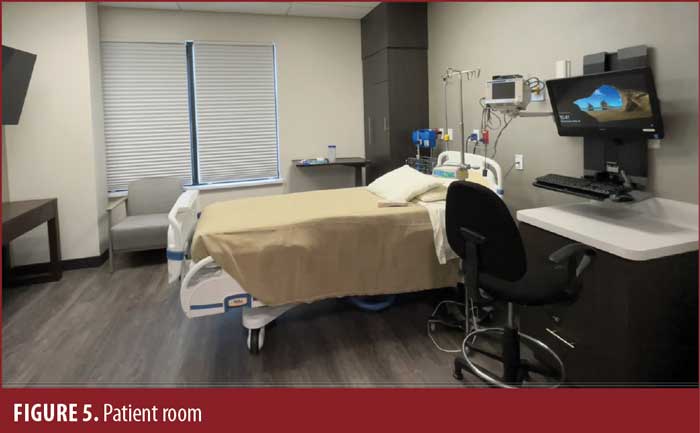
All nurses have a “Badge Buddy,” which has the signs and symptoms of postoperative complications of bariatric surgery and the expected goals/activities of bariatric patients. A bariatric education postsurgical unit resource is also available for reference in case there are questions regarding patient care.
Patient Compliance
From our first contact with our bariatric surgery patients, we stress the importance of follow-up with their surgeons during their weight loss journey. We also stress the importance of the experience our surgeons have in recognizing complications that other physicians might not recognize.
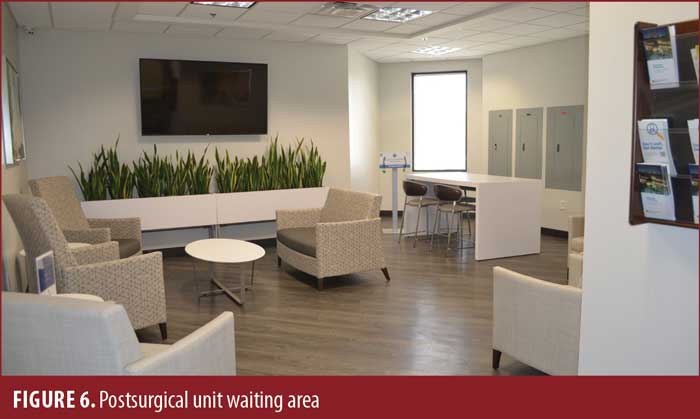
In addition, we offer virtual monthly support group meetings with a variety of speakers to help support patients on topics from diet and exercise to fashion. We measure long-term success and adherence through visit notes provided by the surgeon’s office. If a long-term follow-up assessment was not done, our MBSCR will contact patients (minimum of 2 attempts) through email and/or phone calls.
Interesting Case
In June 2022, an 18-year-old male patient with a history of morbid obesity, hypertension (HTN), Stage V kidney disease, and prediabetes presented to one of our bariatric surgeons. The patient had health concerns and a desire to lose weight so that he could qualify for a kidney transplant. His highest recorded body mass index (BMI) was 57kg/m2. He needed to achieve a BMI of 35kg/m2 to qualify for a transplant.
The patient was diagnosed with Stage V kidney disease of unknown etiology in August 2021. On the day of surgery, his blood urea nitrogen (BUN) was 81mmol/L and creatinine was 10.6mg/dL, and he was seen by a nephrologist. He had bilateral arteriovenous (AV) fistulas placed, which were nonfunctioning and related to thrombus. He planned to have a new AV fistula placed and anticipated starting hemodialysis after a catheter was placed while waiting on the fistulas to mature. The internal medicine hospitalist spoke with the patient’s nephrologist and stated that BUN/creatinine were within his baseline range. He was acidotic with a bicarbonate level of 16.3mEq/L but had no signs or symptoms of uremia. He had no signs or symptoms of fluid overload, and his vital signs were stable.
The patient had a robotic, laparoscopic gastric sleeve. He tolerated the procedure well. He denied pain, shortness of breath, and nausea/vomiting. He tolerated bariatric clear liquids and had adequate urine output. He was discharged in stable condition the next day. He was asked follow-up with his nephrologist postoperatively for continued monitoring.
The patient had a one-week follow-up with the surgeon, and he had lost 20lbs since surgery and was tolerating his diet. His pain was well controlled, and he was not taking any pain medication. He walked for exercise and was able to do his activities of daily living without issues. The patient was doing well and had no complaints or issues. Thanks to the surgery, he will be able to qualify for a kidney transplant and achieve better health overall.
Category: Bariatric Center Spotlight, Current Issue




